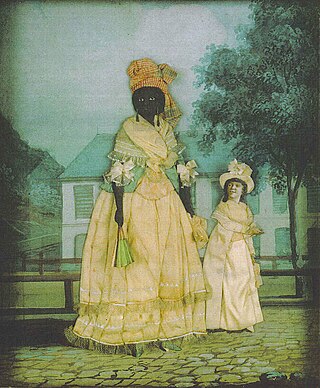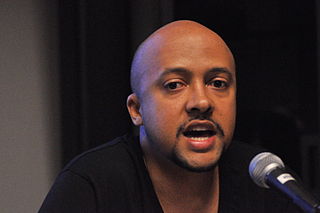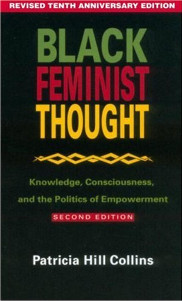Black matriarchy is a term for the black American families mostly led by women.[ by whom? ]
Black matriarchy is a term for the black American families mostly led by women.[ by whom? ]
The issue was first brought to national attention in 1965 by sociologist and later Democratic Senator Daniel Patrick Moynihan, in the Moynihan Report (also known as "The Negro Family: The Case For National Action"). [1] Moynihan's report made the argument that the relative absence of nuclear families (those having both a father and mother present) in Black America would greatly hinder further Black socioeconomic progress. [1]
A study of 1880 family structure in Philadelphia shows that three-quarters of Black families were nuclear families, composed of two parents and children. [2] In New York City in 1925, 85 percent of kin-related Black households had two parents. [2] In 1940, the illegitimacy rate for Black children was 19 percent. [2]
When Moynihan warned in his 1965 report of the coming destruction of the Black family, the out-of-wedlock birthrate was 25 percent among Blacks. [1] By 1991, 68 percent of Black children were born outside of marriage. [3] In 2011, 72 percent of Black babies were born to unwed mothers. [4] [5]
Some will disagree with the idea of a Black matriarchy because they see Black matriarchy being used in a derogatory way. The author of the article "The Myth of the Black Matriarchy" argues that black women were seen in a threatening way and their position in the family has resulted in the psychological castration of the black male and has produced a variety of other negative effects. These negative effects include low educational achievements, personality disorders, juvenile delinquency, etc. [6]
2011 Census Bureau data compiled by Kids Count, a project of the Annie E. Casey Foundation, shows that about 67% of black children [7] are living in a household without their father. Fathers play an emotional role in families, and their absence can be detrimental to the development of their children. For young girls the absence of their fathers can influence how promiscuous the daughter is with her physical sexuality. [8] Also they may seek more attention from men and tend to have had more physical contact with boys than other girls their age. [8] It has been shown that boys without fathers tend to become gang affiliated more than those who have a two parent home. [9] In the oral survey the writer conducted with 25 black males ages 15 to 25 who had either been to jail, or on probation, or had a criminal record or had criminal charges 13 pending, it was found that 21 out of the 25 subjects were raised by a single mother. Seventeen of them said they thought that if their fathers were present during their upbringing, it could have made a difference in their lives. [9] These theories have been challenged by various collected data, including data shown by the Center for Disease Control (CDC). [10] [ need quotation to verify ]
General:

Matriarchy is a social system in which positions of responsibility, dominance and privilege are held by women. In a broader sense it can also extend to moral authority, social privilege, and control of property. While those definitions apply in general English, definitions specific to anthropology and feminism differ in some respects. Most anthropologists hold that there are no known societies that are unambiguously matriarchal.
A single parent is a person who has a child or children but does not have a spouse or live-in partner to assist in the upbringing or support of the child. Reasons for becoming a single parent include decease, divorce, break-up, abandonment, becoming widowed, domestic violence, rape, childbirth by a single person or single-person adoption. A single parent family is a family with children that is headed by a single parent.
Legitimacy, in traditional Western common law, is the status of a child born to parents who are legally married to each other, and of a child conceived before the parents obtain a legal divorce. Conversely, illegitimacy, also known as bastardy, has been the status of a child born outside marriage, such a child being known as a bastard, a love child, a natural child, or illegitimate. In Scots law, the terms natural son and natural daughter carry the same implications.

Womanism is a term originating from the work of African American author Alice Walker in her 1983 book In Search of Our Mothers' Gardens, denoting a movement within feminism, primarily championed by Black feminists. Walker coined the term "womanist" in the short story Coming Apart in 1979. Her initial use of the term evolved to envelop a spectrum of issues and perspectives facing black women and others.
Victim blaming occurs when the victim of a crime or any wrongful act is held entirely or partially at fault for the harm that befell them. There is historical and current prejudice against the victims of domestic violence and sex crimes, such as the greater tendency to blame victims of rape than victims of robbery if victims and perpetrators knew each other prior to the commission of the crime. The Gay Panic Defense has also been used to justify violence against LGBT people.

The Negro Family: The Case For National Action, commonly known as the Moynihan Report, was a 1965 report on black poverty in the United States written by Daniel Patrick Moynihan, an American scholar serving as Assistant Secretary of Labor under President Lyndon B. Johnson and later to become a US Senator. Moynihan argued that the rise in black single-mother families was caused not by a lack of jobs, but by a destructive vein in ghetto culture, which could be traced to slavery times and continued discrimination in the American South under Jim Crow.

In the British colonies in North America and in the United States before the abolition of slavery in 1865, free Negro or free Black described the legal status of African Americans who were not enslaved. The term was applied both to formerly enslaved people (freedmen) and to those who had been born free, whether of African or mixed descent.

Patricia Hill Collins is an American academic specializing in race, class, and gender. She is a distinguished university professor of sociology emerita at the University of Maryland, College Park. She is also the former head of the Department of African-American Studies at the University of Cincinnati. Collins was elected president of the American Sociological Association (ASA), and served in 2009 as the 100th president of the association – the first African-American woman to hold this position.

Tavia Nyong'o is a critic and scholar of art and performance. He is William Lampson professor of African American studies, American studies and theater and performance studies at Yale University where he teaches courses on black diaspora performance, cultural studies, and critical and aesthetic theory.
A "welfare queen" is a derogatory term used in the United States to describe individuals who are perceived to misuse or abuse the welfare system, often through fraudulent means, child endangerment, or manipulation. The media's coverage of welfare fraud began in the early 1960s and was featured in general-interest publications such as Reader's Digest. The term gained widespread recognition following media reporting in 1974 regarding the case of Linda Taylor. It was further popularized by Ronald Reagan during Reagan's 1976 presidential campaign when he frequently embellished Taylor's story in his speeches.
An othermother is a woman caring for children who are not biologically her own.

A matriarchal religion is a religion that emphasizes a goddess or multiple goddesses as central figures of worship and spiritual authority. The term is most often used to refer to theories of prehistoric matriarchal religions that were proposed by scholars such as Johann Jakob Bachofen, Jane Ellen Harrison, and Marija Gimbutas, and later popularized by second-wave feminism. These scholars speculated that early human societies may have been organized around female deities and matrilineal social structures. In the 20th century, a movement to revive these practices resulted in the Goddess movement.

In the United States, the traditional family structure is considered a family support system involving two married individuals providing care and stability for their biological offspring. However, this two-parent, heterosexual, nuclear family has become less prevalent, and nontraditional family forms have become more common. The family is created at birth and establishes ties across generations. Those generations, the extended family of aunts and uncles, grandparents, and cousins, can hold significant emotional and economic roles for the nuclear family.
Feminism is one theory of the political, economic, and social equality of the sexes, even though many feminist movements and ideologies differ on exactly which claims and strategies are vital and justifiable to achieve equality.
A matrifocal family structure is one where mothers head families and fathers play a less important role in the home and in bringing up children.

Black Feminist Thought: Knowledge, Consciousness and the Politics of Empowerment is a 1990 book by Patricia Hill Collins.
Caban v. Mohammed, 441 U.S. 380 (1979), was a United States Supreme Court family law case which argued that a New York law, which allowed unwed mothers, but not unwed fathers, a veto over the adoption of that couple's children, was discriminatory.
Hortense J. Spillers is an American literary critic, Black Feminist scholar and the Gertrude Conaway Vanderbilt Professor at Vanderbilt University. A scholar of the African diaspora, Spillers is known for her essays on African-American literature, collected in Black, White, and In Color: Essays on American Literature and Culture, published by the University of Chicago Press in 2003, and Comparative American Identities: Race, Sex, and Nationality in the Modern Text, a collection edited by Spillers published by Routledge in 1991.

The family structure of African Americans has long been a matter of national public policy interest. A 1965 report by Daniel Patrick Moynihan, known as The Moynihan Report, examined the link between black poverty and family structure. It hypothesized that the destruction of the black nuclear family structure would hinder further progress toward economic and political equality.
Multiracial feminist theory refers to scholarship written by women of color (WOC) that became prominent during the second-wave feminist movement. This body of scholarship "does not offer a singular or unified feminism but a body of knowledge situating women and men in multiple systems of domination."